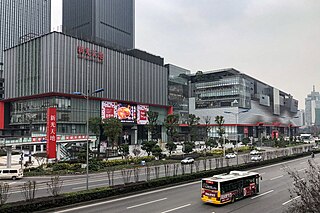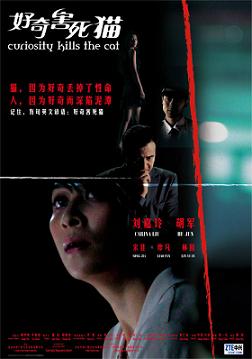
Chongqing is a direct-administered municipality in Southwestern China. Chongqing is one of the four direct-administered municipalities under the Central People's Government, along with Beijing, Shanghai, and Tianjin. It is the only directly administrated municipality located deep inland. The municipality covers a large geographical area roughly the size of Austria, which includes several disjunct urban areas in addition to Chongqing proper. Due to its classification, the municipality of Chongqing is the largest city proper in the world by population, though Chongqing is not the most populous urban area.

The Chongqing Rail Transit is the rapid transit system in the city of Chongqing, China. In operation since 2005, it serves the transportation needs of the city's main business and entertainment downtown areas and inner suburbs. As of December 2023, CRT consisted of eleven lines, with a total track length of 523.68 km (325 mi). Lines 1, 4, 5, 6, 9, 10, 18, the Loop line and Jiangtiao line are conventional heavy-rail metro lines, while Lines 2 and 3 are high-capacity monorails. To keep up with urban growth, construction is under way on Line 18 and several other lines, in addition to extensions to Lines 5, 6 and 10.

Chongqing Jiangbei International Airport is the main international airport serving the city of Chongqing in Southwestern China. It is located in Yubei, Chongqing, about 19 kilometres (12 mi) north of the Chongqing urban center.

Black Cat Detective is a Chinese animated television series based on a 1982 manhua written by Zhu Zhixiang produced by the Shanghai Animation Film Studio. It is sometimes shortened as Mr. Black. The main character, Black Cat Detective. was created by Zhu Zhixiang (诸志祥).

Yubei District, literally meaning the north of Yu, is a district of Chongqing municipality, bordering Sichuan province to the north. Lianglu, which is a town administered by Yubei District, is where the Chongqing Jiangbei International Airport is located.

China Express Airlines is a regional airline with its corporate headquarters on the grounds of Chongqing Jiangbei International Airport, Chongqing, China.

Curiosity Kills the Cat is a 2006 Chinese thriller film directed by Zhang Yibai. The film is set in the director's home city of Chongqing. Produced by China Vision Group and Eagle Spirit Management, Curiosity Kills the Cat stars Hu Jun, Liao Fan, as well as veteran Hong Kong actress Carina Lau. Though primarily a mainland Chinese production, international sales was handled by Hong Kong–based Golden Network.

The Chongqing gang trials were a series of triad-busting trials in the city of Chongqing that began in October 2009 and concluded in 2011. Carried out under the auspices of municipal Communist Party chief Bo Xilai and police chief Wang Lijun, a total of 4,781 suspects were arrested, including 19 suspected crime bosses, hundreds of triad members, and a number of allegedly corrupt police, government and Communist party officials, including six district police chiefs and the city's former deputy police commissioner, Wen Qiang. Time described it as "China's trial of the 21st century". The crackdown is believed to be the largest of its kind in the history of the People's Republic of China. Concerns over due process surfaced following the trial, including allegations of torture, forced confessions, and intimidation.

The Shibanpo Yangtze River Bridge consists of a pair of prestressed concrete box girder bridges over the Yangtze River in Chongqing, China. The bridges carries 8 lanes of traffic on Jiangnan Avenue between the Nan'an District south of the Yangtze River and the Yuzhong District to the north.
Liu Hu is a Chinese journalist who was listed as one of the "One Hundred News Heroes" by Reporters Without Borders in 2014.
He Ting is a former Chinese official best known for his term as police chief of the interior megacity of Chongqing. He was removed from office in June 2017 and subsequently expelled from the Chinese Communist Party (CCP) for violating party rules. A lifelong public security official with a specialty in anti-terrorism operations, He served two regional tenures before being transferred to Chongqing to take over local law enforcement from disgraced police chief Wang Lijun.
The Jiaochangkou incident was a political riot that took place on 10 February 1946 in Jiaochangkou in the centre of Chongqing City, which was the wartime capital of the Republic of China and declared the second capital after the war by the Nationalist -led government. During 1945–46, KMT and the Chinese Communist Party (CCP) held political negotiations over the future of China in the city. The incident marked an open rivalry between the two parties, which eventually led to a civil war that ended up with a CCP victory.

Holger Chen or Chen Chih-han, is a Taiwanese internet celebrity, entrepreneur, political activist and mixed martial artist. He is also known popularly as Kuan Chang in Taiwan, being the founder and CEO of G.K. Fitness Club (成吉思汗健身俱樂部), named after Genghis Khan. As an actor, Chen had his first appearance as a cameo in the 2008 film Parking. He is referred by some as the Joe Rogan of Taiwan.

Chongqing Liangjiang Athletic was a Chinese professional football club based in Chongqing.
The Chongqing Morning Post, also known as Chongqing Morning News or Chongqing Chenbao, is a Chinese-language newspaper published in Chongqing, China.
Hualong Station is a station on Loop line of Chongqing Rail Transit in Chongqing municipality, China. It is located in Jiulongpo District and opened in 2021.
The Delivery Knights Alliance is a food delivery organization and informal labor union in China.

Pangdonglai is a retail corporation founded in March 1995 by Yu Donglai (于东来). It operates a chain of malls and grocery stores and is headquartered in Xuchang, Henan, China. The company is known for excellent customer service, and prioritizing work-life balance for its employees. In 2024 Pangdonglai paid out RMB¥8.8 million in compensation to customers after a supplier was found to have violated food safety procedures. Its success has spurred imitation of its business style by competitors.

ChaPanda, also known as Chabaidao, in Chinese, is a tea beverage brand in the People's Republic of China. ChaPanda is China's third-largest retailer of freshly made tea drinks and has a 6.8% market share, up from 6.6% in 2022. It operates mainly through franchises and has established a network of more than 8,000 stores since opening its first one in Chengdu, Sichuan, in 2008.
The cat theory of Deng Xiaoping, the paramount leader of China between 1978 and 1989, is a pragmatic economic philosophy which can be summarized by "it doesn't matter if a cat is black or white, as long as it catches mice (不管黑猫白猫,能捉到老鼠就是好猫)". Deng argued that, planned economy or market economy is only a tool for distributing resources and has nothing to do with political institution, in other words socialism can have market and capitalism can have planning. The cat theory became widely known within the Chinese society after Deng Xiaoping's southern tour in 1992, and was an underlying ideology guiding the reform and opening of China.













